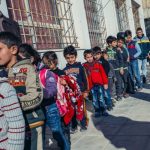Integrity is an international consultancy and service provider working in challenging and complex environments around the world. We offer integrated research, monitoring, evaluation and learning services to support evidence-based programming in such contexts. With offices in DC, London, Amman, and Nairobi, we have delivered over 200 projects for clients including USAID, the Department of State, the UK Department for International Development (DFID), and the UK Foreign and Commonwealth Office.
The ongoing conflict in Syria has affected millions through economic hardship, displacement, and human suffering. Within this context, the humanitarian and development communities continue to provide education to children. In an effort to strengthen the evidence base about good education programming in conflict settings, Integrity recently led a study to assess the status of education in Syria and provide recommendations to key stakeholders.
A Study of Education in Syria
 In 2018—2019, Integrity conducted a ten-month study examining how teacher practices and learning spaces influence child learning and wellbeing. Commissioned by DFID, the study represented the first large-scale research since the start of the conflict, and assessed teacher practice and behavior, the nature of the learning environment, and their effects on child learning and wellbeing against existing standards from the Education in Crisis and Conflict (EICC) community.
In 2018—2019, Integrity conducted a ten-month study examining how teacher practices and learning spaces influence child learning and wellbeing. Commissioned by DFID, the study represented the first large-scale research since the start of the conflict, and assessed teacher practice and behavior, the nature of the learning environment, and their effects on child learning and wellbeing against existing standards from the Education in Crisis and Conflict (EICC) community.
Building on the existing evidence base, Integrity employed a novel three-pronged approach to gather new evidence to support better Syria and global EiCC programming. This methodology included:
Assessing the quality of teaching and learning behaviors in conflict settings. The study examined the learning environments of children in Grades 2 and 3 in areas not controlled by the Government of Syria (GoS). It sought to generate evidence of the state of education through direct observations of teacher practices and learning spaces as well as consultations with teachers, parents, and children across varying zones of control, including Ar-Raqqa, Aleppo, and Idlib governorates.
Adopting rigorous methods for primary data collection. Integrity’s team consulted nearly 6,000 informants to gather a wealth of primary data. This is of note, as studies in fragile and conflict-affected states (FCAS) often rely on secondary data and presume that because primary data collection is difficult, it can be simplified or avoided.
Promoting broad stakeholder engagement and analysis of results. To ensure the study’s findings were meaningful and actionable, Integrity included a consultation process with 250 sector stakeholders. This process sought to ensure that findings were relevant and useful and to guide adaptations and improvements in future programming in both Syria and other EiCC contexts.
Findings
The study presented some good news, identifying several positive practices upon which rapid improvements could be made. For example, variations of the GoS curriculum were found across most zones of control, and such standardized curriculums support movement and reintegration of children, as well as certifications of formal learning. The study also found several positive behaviors: teachers had high self-efficacy rates, under observation they exhibited good teaching practices, teacher performance assessments took place regularly, and teachers were open to using participatory methods.
However, the study also highlighted significant challenges, suggesting that poor standards and practices were failing to alleviate children’s wellbeing and learning challenges, and could even be contributing to their worsening. For example, while teachers demonstrated knowledge of good teaching practices, they often reverted to rote and didactic practices with limited differentiated support to children struggling. Verbal and physical abuse by teachers was also common – which likely worsen children’s wellbeing and learning opportunities. Furthermore, despite high levels of attendance, children received well below the recommended learning time, with an average of 3.3 hours per day. Teachers were also found to be under-skilled and under-supported with limited supervision, and teaching behaviors were not conflict sensitive. There were limited to no peer networks and specialists trained in psychosocial support to address trauma and other needs, and few school spaces support recreation. These issues pose significant barriers to children’s learning and wellbeing.
About Integrity
Learn more about Integrity at http://www.integrityglobal.com







